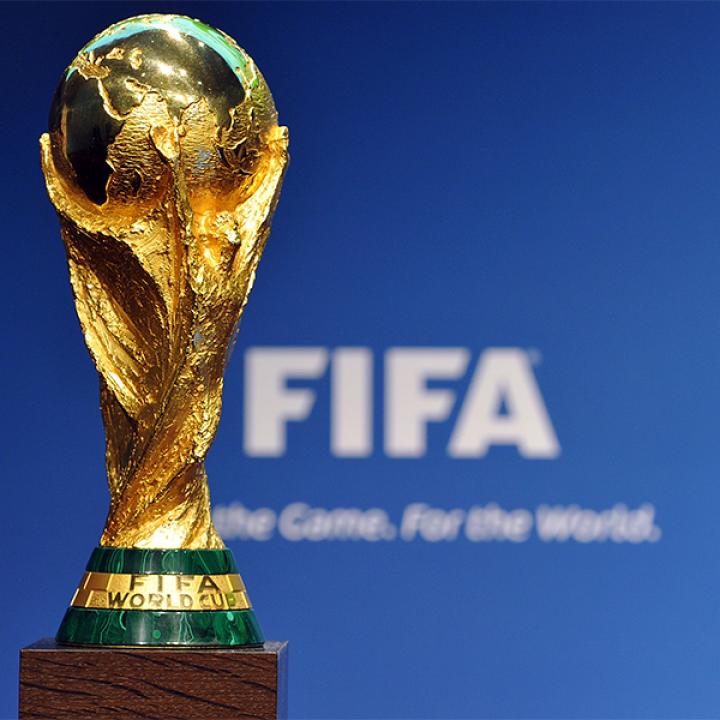
- Policy Analysis
- Special Events
2022 Qatar World Cup: Sports, Politics & Human Rights

Watch an expert panel discussion of the political, diplomatic, economic, social, and strategic implications of the 2022 World Cup for Qatar and the wider Middle East.
On October 19, The Washington Institute’s Aeder Family LINK program held a hybrid event with Marti Flacks, James M. Dorsey, and Susan L. Ziadeh. The discussion was moderated by Patrick Clawson. Flacks is the Khosravi Chair in Principled Internationalism and director of the Human Rights Initiative at the Center for Strategic and International Studies (CSIS). Dorsey is a columnist and author of the blog and book: The Turbulent World of Middle East Soccer. Ziadeh served for twenty-three years in the State Department, including as deputy assistant secretary for Arabian Peninsula affairs and ambassador to Qatar. Clawson is the Institute’s Morningstar Senior Fellow and director of research. The following is a rapporteur’s summary of their remarks.
Marti Flacks
While the 2022 World Cup in Qatar will begin at the end of November, there are already lessons learned for the host country and for football's governing body, FIFA. Twelve years ago, when FIFA announced that Qatar would host the 2022 World Cup, pressure mounted on Doha to enact reforms and on FIFA to make human rights a key consideration in future bidding processes.
Qatar winning the 2022 World Cup bid led to a significant amount of scrutiny of the Gulf nation over the widespread mistreatment and abuse of foreign workers, who make up 95% of the workforce. One of the reasons for the exploitation of migrant workers lies in the kafala, or sponsorship system, which has historically restricted worker’s freedoms. Increased pressure from international labor and human rights organizations has led to notable progress on issues like exit visas and minimum wages. Over the past two years, Qatar lifted some restrictions to make it easier for some migrant workers to exit the country without their employer’s permission, put in place a more realistic minimum wage, and enhanced wage protection. However, substantial progress and additional work to enforce and implement these reforms remain. It is important that conversations about migrant workers’ rights in Qatar remain on the agenda after the games end.
Human rights groups have welcomed the engagement and the attention to the issue of human rights in Qatar because it gave them an opening to engage that has not existed before with other mega sporting events like the Olympics or LIV golf. However, the controversy over Qatar hosting the World Cup triggered unprecedented protest, so it should not be assumed that if given the opportunity to host a major sporting event, other counties will make similar reforms.
As the games officially begin, the human rights and labor community will be closely monitoring freedom of speech and expression issues throughout the tournament. Already, Qatar has issued filming restrictions for foreign broadcasters ahead of the World Cup. If Qatar cracks down on chants and if fans have their freedom of expression blocked, Qatar can expect more backlash from the human rights community. Another potential flashpoint is the controversy surrounding FIFA’s strict dress code which prohibits the wearing of armbands. European teams have said they plan to wear armbands as part of a human rights campaign against LGBTQ+ discrimination at the Qatar World Cup, but this act is a largely symbolic gesture, and while gestures are important, it will likely make little impact in Qatar. Athletes should look beyond a symbolic gesture and think more about their engagement financially with the tournament. Another issue that will likely emerge as the games begin is the issue of compensation to workers killed or injured while building the stadiums.
James M. Dorsey
Qataris were taken by surprise by the level of criticism they received after winning the bid to host the World Cup. The Supreme Committee for Delivery and Legacy—the committee in charge of infrastructure and operations for Qatar’s hosting of the Cup—worked at a different speed than other parts of the government, which caused a delay in implementing reforms. While human rights groups might not be satisfied with Qatar’s progress, their activism paid off. Qatar also set itself apart from other Gulf nations by openly engaging with its critics. Though attention on foreign workers’ rights in Qatar will likely lessen following the conclusion of the games, pressure on the region for more reforms on human rights issues will likely remain and will be a long-term challenge for Qatar after 2022.
As the games unfold, there are a few things that spectators should look out for. Qatar has a different cultural and legal context than many of the visitors’ home countries. For that reason, Qataris are attempting to accommodate issues like alcohol and public displays of affection with dedicated “fan zones” and by bringing in law enforcement and security from other countries. How Qatar handles these issues is going to determine what soft power benefit the World Cup will have and how it will be remembered. Concerns have also arisen for women attending the World Cup. Women do play a public role in Qatar and the country has responded proactively to demands that it include women athletes. In general, Qatar has been embracing rather than rejecting the issue of women and sports.
Critics have accused Qatar of sportswashing, which is a term used to describe a country’s use of international sports to improve its image. Sportswashing, however, might be a misleading choice of words in this case. While Qatar might be trying to improve its image, this is not the sole driver for its decision to host the games. There are other domestic factors at play, like the economic benefits of hosting. Sportswashing is only one element.
While there were reports of wrongdoing in the Qatari bid, the Gulf nation has received an outsized amount of criticism compared to the efforts of past host countries. The World Cup bidding process has a long history of corruption including the controversy surrounding Germany's bid to host the 2006 World Cup and the 2018 games in Russia. Many of the European countries that are currently protesting the Qatar World Cup were not as outspoken during the 2018 games in Russia, which were under the shadow of Moscow’s illegal annexation of Crimea and its abuse against LGBTQ+ communities.
The use of sports by regimes to rebrand themselves and as a public diplomacy tool in the Middle East has changed over time. The Arab Spring changed almost every aspect of life, including football, and the sport played a significant role in this movement. When anti-government protesters took to the streets in 2011, soccer was suspended for months at a time because stadiums became hotbeds for demonstrations.
In parts of the Middle East, sports—particularly football—have been key to the formation and building of national identities. The upcoming 2022 World Cup tournament is a high-stakes game for Qatar with the potential to enhance soft power capabilities and public diplomacy.
Susan Ziadeh
When I assumed my former position as U.S. ambassador to Qatar in 2011—a year after the country was awarded the World Cup bid—the first item on the U.S. agenda was human rights, particularly in the case of migrant workers. After receiving the bid, Doha made progress on human rights issues and took early steps to reform its employment system. In 2013, Qatar introduced measures to improve the labor situation and establish better labor standards. The relatively slow pace of reform is a result of the gap between the Qatari government, the business community, and the local population. Another, more recent change is the cabinet reshuffle in which the former president of the National Human Rights Committee of the State of Qatar was appointed as the new minister of labor.
The tournament will translate into substantial economic gains for Qatar, act as a moment of pride for many people in the region, and win it some diplomatic leeway. The impact of the games will extend beyond just Qatar. When it was announced that the country would host the first FIFA World Cup in the Middle East and the Arab world, much of the region reacted negatively at first, but the games have the potential to inspire some positive changes. Qatar instituted changes and reforms that other countries might emulate as they look to diversify and engage in soft power using sports. Saudi Arabia may follow suit as it prepares to host the 2029 Asian Winter Games, as may other countries that look to host other mega-sporting events in the future.
The United States is set for a highly anticipated World Cup faceoff with Iran, and many expect World Cup fans, players, and world leaders to use this as an opportunity to speak out on the ongoing protests. The game will be a charged environment, and fans will take a political stand. It will be interesting to see how such public demonstrations will be handled at the site due to Qatar’s relationship with Iran.
Qatar’s hosting of the event has been characterized as a classic case of sportswashing, but myriad other factors influenced its decision to host the tournament. The games will deliver political, economic, and social benefits to the Gulf nation and have the potential to put Qatar in a different place on the world stage.
This summary was prepared by Anna Brown and Shaina Katz.






